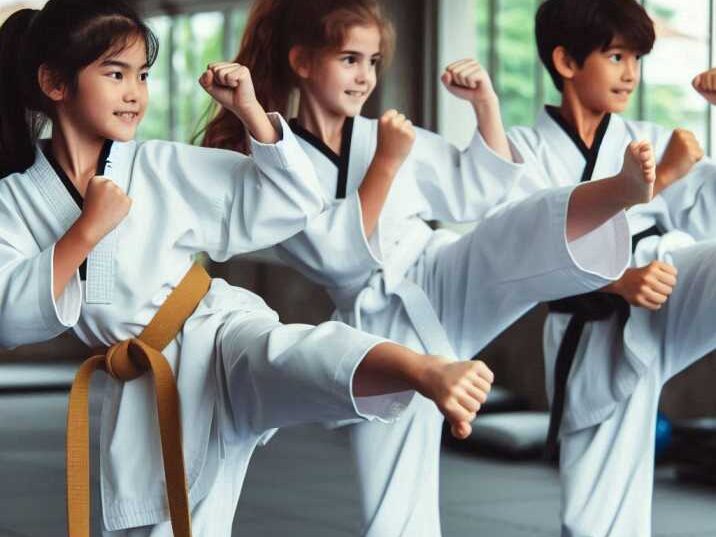Introduction
Table of Contents
Taekwondo is a Korean martial art known for its powerful kicks, quick footwork, and disciplined training. It’s a popular choice for many looking to learn self-defence, and it offers much more than just physical skills. In this article, we’ll explore why Taekwondo is good for self-defence, how it helps improve focus and discipline, and why it’s an excellent activity for kids and adults alike.

What is Taekwondo?
Taekwondo, meaning “the way of the foot and the hand,” emphasizes fast, high, and spinning kicks. It is not only a physical activity but also a mental and moral discipline that combines combat techniques, self-defence, sport, exercise, meditation, and philosophy.
Benefits of Taekwondo for Self-Defense
Effective Self-Defense Techniques
Striking Skills:
Taekwondo teaches powerful strikes using both hands and feet, which are crucial for self-defence. These strikes include punches, chops, and a variety of kicks such as front kicks, roundhouse kicks, and side kicks. Practitioners learn to deliver these strikes with precision and power, enabling them to defend themselves effectively in dangerous situations. The focus on accuracy and force ensures that even smaller individuals can protect themselves against larger opponents.
Quick Reflexes:
Training in Taekwondo greatly enhances reflexes, which are essential for self-defence. Practitioners engage in sparring and drills that require quick reactions and fast movements. This training helps them develop the ability to respond swiftly to unexpected attacks, block strikes and counterattacks efficiently. Quick reflexes can make a significant difference in a self-defence situation, allowing individuals to evade danger and protect themselves more effectively.
Situational Awareness:
Taekwondo practitioners are taught to be constantly aware of their surroundings, a skill known as situational awareness. This awareness involves being vigilant and recognizing potential threats before they become immediate dangers. Through various exercises and sparring sessions that mimic real-life scenarios, students learn to anticipate and avoid conflicts. Being aware of exits, possible hazards, and the actions of others helps practitioners stay safe and respond appropriately to any threats.
Building Physical Strength
Core Strength:
Taekwondo workouts are excellent for building core strength, which is vital for balance and powerful movements. Many techniques in Taekwondo, especially kicks, require strong abdominal and lower back muscles. Regular practice involves exercises that strengthen the core, enhancing overall stability and power. A strong core not only improves martial arts performance but also supports better posture and reduces the risk of injuries.
Flexibility:
Flexibility is a key benefit of practising Taekwondo. The martial art involves a variety of high kicks and dynamic movements that require and develop flexibility. Regular stretching and flexibility exercises are integral parts of Taekwondo training, helping practitioners perform techniques more efficiently and reducing the likelihood of muscle strains and injuries. Increased flexibility also allows for higher kicks and smoother, more controlled movements.
Endurance:
Taekwondo training significantly improves cardiovascular health and overall endurance. The high-intensity workouts, including sparring, drills, and form practice, provide a robust aerobic exercise that strengthens the heart and lungs. This improved endurance enables practitioners to sustain physical activity for longer periods, enhancing their ability to defend themselves in prolonged self-defence situations and contributing to overall fitness and well-being.
Mental Discipline
Focus:
Training in Taekwondo requires a high level of concentration and discipline. Practitioners must focus on mastering techniques, following instructions, and performing movements accurately. This mental discipline translates to improved focus in other areas of life, such as school and work, as students learn to concentrate better and stay committed to their goals.
Confidence:
Achieving new belts and mastering techniques in Taekwondo training builds confidence. Each accomplishment, whether it’s learning a new kick or earning a higher belt, reinforces a sense of achievement and self-worth. This growing confidence helps kids feel more capable of handling difficult situations, both in and out of the dojo, making them more resilient and self-assured.
Stress Relief:
The physical activity and mental focus required in Taekwondo training provide excellent stress relief. Engaging in regular workouts helps release tension and reduces anxiety, while disciplined practice promotes a calm and focused mind. The combination of physical exertion and mental clarity makes Taekwondo a powerful tool for managing stress and maintaining mental health.
How Taekwondo Helps Improve Focus
Structured Training
Routine:
Regular Taekwondo training provides a consistent and structured routine, helping children develop a sense of organization and discipline. This routine extends beyond the dojo, aiding in better time management and consistency in other activities, including schoolwork.
Goal Setting:
The belt system in Taekwondo encourages students to set and achieve goals. Each belt level represents a new set of skills to master, teaching perseverance and determination. These goal-setting skills are transferable to academic and personal success, fostering a mindset of continuous improvement.
Attention to Detail:
Learning complex forms, or patterns of movements, requires careful attention to detail. Practitioners must focus on precise techniques and sequences, which enhances their overall concentration and ability to pay attention to finer points in various tasks, including academic work.
Mind-Body Connection
Mindfulness:
Taekwondo training promotes mindfulness by encouraging practitioners to be aware of their bodies and movements. This heightened awareness improves focus as students learn to concentrate fully on their actions, leading to better control and coordination.
Meditation:
Some Taekwondo schools incorporate meditation into their training routines. Meditation practices help calm the mind and improve focus by teaching students to clear their thoughts and concentrate on the present moment. This mental clarity can significantly enhance their ability to stay focused in other areas of life.
The Discipline of Taekwondo
- Respect and Courtesy
- Bow to Instructors: Showing respect to instructors and fellow students is a core tenet of Taekwondo.
- Following Rules: Adhering to the rules and traditions of the dojo (training hall) teaches discipline and respect.
- Perseverance
- Overcoming Challenges: Students learn to push through physical and mental challenges.
- Consistent Practice: Regular practice instils a sense of discipline that can be applied to other areas of life.
Why Taekwondo is Good for Kids
Physical Fitness
Exercise:
Regular Taekwondo training sessions keep kids active, promoting overall health and fitness. The physical activity involved in classes helps improve cardiovascular health, strength, flexibility, and endurance, making it a fun and effective way for children to stay healthy and fit.
Coordination:
Learning and performing complex Taekwondo techniques greatly enhances coordination and motor skills. Practitioners must execute precise movements, which helps develop their hand-eye coordination, balance, and overall body control. This improved coordination is beneficial not only in martial arts but also in daily activities and other sports.
Character Building
Respect:
Taekwondo instill a strong sense of respect for oneself and others. Students learn to show respect to their instructors, peers, and the martial arts itself through disciplined behaviour and proper etiquette. This value of respect extends beyond the dojo, positively influencing their interactions at home, school, and in their communities.
Responsibility:
Students in Taekwondo learn to take responsibility for their training and progress. They are encouraged to practice regularly, set personal goals, and work diligently to achieve them. This sense of responsibility helps children develop self-discipline and accountability, important traits for personal growth and success.
Social Skills
Teamwork:
Partner drills and group activities in Taekwondo foster teamwork and social interaction. Students often work together to practice techniques, spar, and participate in exercises, teaching them the importance of collaboration, communication, and supporting one another.
Making Friends:
Taekwondo provides a positive and supportive environment where kids can make new friends. The shared experiences of training and progressing through the belt system create a sense of camaraderie among students, helping them build lasting friendships and enhancing their social skills.

Table of Information about Benefits of Taekwondo for Self-Defense
| Benefit | Description |
|---|---|
| Self-Defense | Teaches practical techniques for real-life situations. |
| Physical Strength | Builds core strength, flexibility, and endurance. |
| Mental Discipline | Enhances focus, confidence, and stress relief. |
| Respect and Courtesy | Emphasizes respect for instructors and peers. |
| Perseverance | Encourages overcoming challenges and consistent practice. |
| Physical Fitness | Promotes regular exercise and improves coordination. |
| Character Building | Instills respect and responsibility in students. |
| Social Skills | Develops teamwork and helps make new friends. |
Conclusion
Taekwondo is not only a fantastic way to learn self-defence but also an excellent activity for building physical fitness, mental discipline, and social skills. It helps children and adults alike to improve focus, gain confidence, and develop respect and perseverance. Whether you’re looking to defend yourself, get fit, or find a structured and disciplined activity, Taekwondo offers a well-rounded solution. So, why not give Taekwondo a try and experience its many benefits for yourself?
Frequently Asked Questions (FAQs)
- Is Taekwondo suitable for young children?
- Yes, Taekwondo is excellent for young children as it helps develop physical fitness, discipline, and social skills.
- Can Taekwondo be used for self-defence in real-life situations?
- Taekwondo teaches practical self-defence techniques that can be effectively used in real-life situations.
- Does practising Taekwondo help with academic performance?
- Yes, the focus and discipline learned in Taekwondo can translate to better concentration and performance in school.
- Is Taekwondo safe for kids?
- Yes, when taught by qualified instructors, Taekwondo is a safe and beneficial activity for children.
- How long does it take to earn a black belt in Taekwondo?
- It typically takes about 3-5 years of consistent practice to earn a black belt, depending on the student’s dedication and progress.


